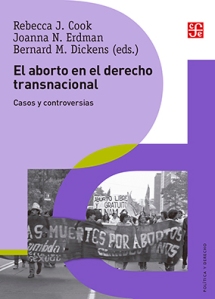SUBSCRIBE TO REPROHEALTHLAW: To receive these updates monthly by email, enter your address in upper right corner of this webpage, then check your email to confirm the subscription.
DEVELOPMENTS
[UN – CEDAW and CRPD] “Guaranteeing sexual and reproductive health and rights for all women, in particular women with disabilities,” Joint statement by the Committee on the Rights of Persons with Disabilities (CRPD) and the Committee on the Elimination of All Forms of Discrimination against Women (CEDAW), 29 August 2018. Decriminalize abortion, repeal discriminatory health policies and abortion laws that perpetuate deep-rooted stereotypes and stigma and undermine women’s reproductive autonomy and choice. PDF online.
CALL FOR PAPERS:
“The Impact of Politics on Sexual and Reproductive Health and Rights,” for publication in Reproductive Health Matters, May 2019. Submissions due October 31, 2018. RHM Call for papers
SCHOLARSHIP:
[abortion law – Brazil] “Brazilian Supreme Court Public Hearing on the Decriminalization of Abortion: Antecedents, Contents, Meanings” by Sonia Corrêa (published by Sexuality Policy Watch, 2018) 27 pages PDF Direct download.
[abortion law – Brazil] Testimony by Prof. Rebecca Cook . . .against Unsafe Abortion in the Public Hearing of the Brazilian Supreme Court, caso ADPF 442, Brasilia, August 3, 2018. English original. em Portugues do Brasil. Testimonio – Espanol traducido por CLACAI (Consorcio Latinoamericano contra el aborto inseguro). Uno otro en Espanol.
[abortion law – El Salvador] “Physicians’ Challenges under El Salvador’s Criminal Abortion Prohibition,” by Alyson Zureick, Amber Khan, Angeline Chen and Astrid Reyes. forthcoming International Journal of Gynecology and Obstetrics, October2018 Early view PDF. Submitted text online at SSRN.
[abortion law – Malawi] “The Duty to make abortion law transparent: A Malawi case study,” by Godfrey Dalitso Kangaude and Chisale Mhango, forthcoming International Journal of Gynecology and Obstetrics, Early view PDF.
Abortion Law in Transnational Perspective: Cases and Controversies, ed. Rebecca Cook, Joanna Erdman and Bernard Dickens (Philadelphia: Univ. Pennsylvania Press, 2014) 20% discount code is PH70. Abstracts of all 16 chapters. Spanish edition by FCE/CIDE – 16 abstracts. Abortion Decisions: Table of Cases in English and Spanish.
[abortion policy] “The Philippines rolls back advancements in the postabortion care policy,” by Melissa Upreti and Jihan Jacob, International Journal of Gynecology and Obstetrics 142 (August 2018): 255–256. PDF online. Submitted text at SSRN.
[abortion policies] “Access to knowledge and the Global Abortion Policies Database,” by Joanna N. Erdman and Brooke Ronald Johnson Jr. International Journal of Gynecology and Obstetrics, July 2018; 142: 120–124 PDF at Wiley online. Submitted text at SSRN.
[Africanness, including sexuality], What is Africanness?: Contesting nativism in culture, race and sexualities, peer-reviewed book by Charles G. Ngwena (Pretoria University Law Press, 2018) 306 pages. “Part 3: Heterogeneous Sexualities” – chapter abstracts. Entire book open access at PULP. Table of Contents. Overview, Comments from scholars, PDFs of all chapters. Podcast on African Rights Talk (2019)
[Brazil – obstetric care, maternal mortality /morbidity, Alyne case] “Implementing international human rights recommendations to improve obstetric care in Brazil,” by Alicia E Yamin, Beatriz Galli and Sandra Valongueiro. International Journal of Gynecology and Obstetrics 143.1 (October 2018): 114-120 Abstract online in English and Portuguese. English PDF for institutional subscribers.
[CEDAW]”The Committee on the Elimination of Discrimination against Women” by Rebecca J. Cook and Cusack, Simone Cusack. In Tara Van Ho and Nigel Rodley, eds, Research Handbook on Human Rights Institutions and Enforcement (Edward Elgar Publishing Ltd, Forthcoming). Submitted text archived online.
[conscience] Unconscionable: When Providers Deny Abortion Care Report of the International Women’s Health Coalition, 2018, based on the first global meeting on the topic of “conscientious objection,” held in Montevideo, Uruguay in August 2017. 8-page report.
[intersex, gender] “Management of intersex newborns: Legal and ethical developments,” by Bernard M. Dickens, forthcoming International Journal of Gynecology and Obstetrics, 2018. Early View PDF.
[self-managed abortion] “Understandings of self-managed abortion as health inequity, harm reduction and social change,” by Joanna N. Erdman, Kinga Jelinska and Susan Yanow. Forthcoming in Reproductive Health Matters. Early view PDF.
[strategic litigation] Seeking Social Change in the Courts: Tools for Strategic Advocacy, by Mónica Roa with Barbara Klugman (Women’s Link Worldwide, 2018) practical tool for advocates from all social justice fields who are interested in using the courts and understanding “strategic litigation” 160 pages, PDF online..
ANNOTATED BIBLIOGRAPHIES:
“The Right to Conscience” – An Annotated Bibliography. (Toronto: International Reproductive and Sexual Health Law Program,
Faculty of Law, University of Toronto, 2018) Conscience bibliography
Indications for abortion: new annotated bibliographies:
- Fetal Anomaly: Annotated Bibliography on legal aspects of fetal anomaly and their implications for counseling, service delivery and abortion laws and policies (Toronto: International Reproductive and Sexual Health Law Program, Faculty of Law, University of Toronto, 2018). Fetal anomaly bibliography
- Rape-related abortion: Legal and policy dimensions of rape-related abortion services (Court decisions, Treaty resources, policy guidance and publications. ) (Toronto: International Reproductive and Sexual Health Law Program, Faculty of Law, University of Toronto, 2018). Rape or Incest bibliography
- Causal Violacion y/o incesto: Selección de doctrina y jurisprudencia latinoamericanas sobre Causal violación y/o incesto en casos de aborto (Rape or Incest bibliography in Spanish) (Toronto: El Programa Internacional de Derecho en Salud Sexual y Reproductivas Facultad de Derecho, Universidad de Toronto, 2018)
US-focused news, resources, and legal developments are available on Repro Rights Prof Blog. View or subscribe.
JOBS
Links to employers in the field of Reproductive and Sexual Health Law are online here
______________
Compiled by the Coordinator of the International Reproductive and Sexual Health Law Program, reprohealth*law at utoronto.ca For Program publications and resources, see our website, online here. TO JOIN THIS BLOG: enter your email address in upper right corner of this webpage, then check your email to confirm the subscription.



 Posted by reprohealthlaw
Posted by reprohealthlaw 



